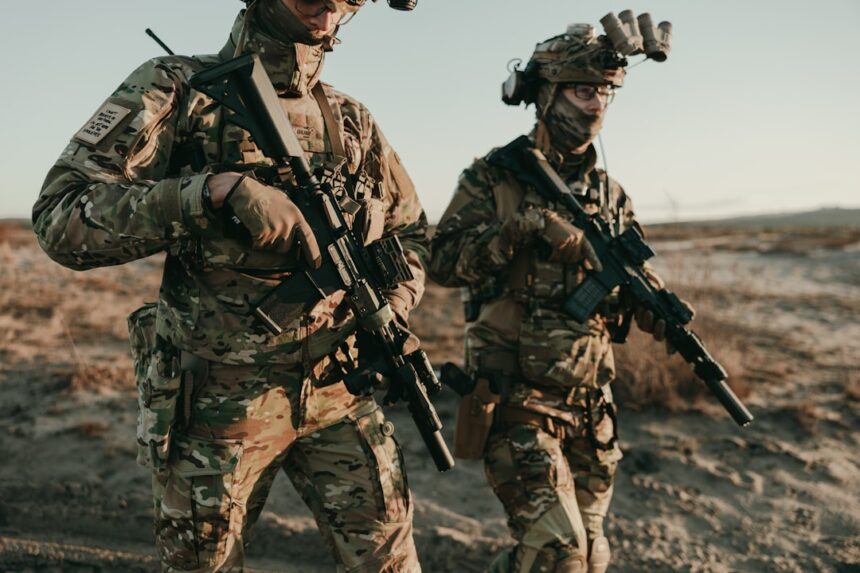Military contractors, often referred to as private military companies (PMCs), have become an integral part of modern warfare and defense strategies. These entities provide a wide range of services, including logistics, training, intelligence, and even direct combat support. Their emergence has transformed the landscape of military operations, allowing governments to outsource various functions that were traditionally performed by state military forces.
This shift raises important questions about the implications of privatizing military functions and the broader impact on global security. The rise of military contractors has been fueled by the increasing complexity of modern conflicts and the need for specialized skills that may not be readily available within conventional armed forces. As nations grapple with budget constraints and the demands of asymmetric warfare, the reliance on these private entities has grown.
Key Takeaways
- Military contractors have played a significant role in modern warfare, providing various services and support to armed forces.
- The history of military contracting dates back to ancient times, but it has evolved significantly with the rise of modern warfare and technological advancements.
- Economic incentives, such as cost savings and efficiency, are key drivers for military contracting, but they also raise ethical and moral considerations.
- Military contractors have a significant influence on government policy, often shaping defense strategies and procurement decisions.
- The lack of accountability and oversight in military contracting has raised concerns about the impact on civilian populations and global security.
The History of Military Contracting
The roots of military contracting can be traced back to ancient times when mercenaries were employed by city-states and empires to bolster their military capabilities. These early forms of contracted military service laid the groundwork for what would evolve into modern military contracting. However, it was not until the late 20th century that the phenomenon began to take on its current form, particularly following the end of the Cold War.
The dissolution of the Soviet Union and subsequent conflicts in the Balkans and the Middle East created a demand for flexible and cost-effective military solutions. In the 1990s, the privatization of military functions gained momentum as governments sought to reduce defense expenditures while maintaining operational effectiveness. The Gulf War marked a significant turning point, as private contractors played a crucial role in logistics and support services.
This trend continued into the 21st century, particularly during the wars in Iraq and Afghanistan, where contractors became essential for various operations, from security to reconstruction efforts. The historical evolution of military contracting reflects broader changes in warfare and statecraft, highlighting the growing acceptance of privatized military solutions.
The Role of Military Contractors in Modern Warfare

In contemporary conflicts, military contractors fulfill a diverse array of roles that extend beyond traditional combat operations. They provide critical support services such as logistics, maintenance, intelligence analysis, and training for local forces. This versatility allows armed forces to focus on core military objectives while relying on contractors for specialized expertise.
For instance, during the Iraq War, contractors were instrumental in rebuilding infrastructure and training Iraqi security forces, showcasing their ability to adapt to various operational needs. Moreover, military contractors often operate in environments where conventional forces may be constrained by political or legal considerations. Their presence can enable rapid responses to emerging threats without the need for formal troop deployments.
This flexibility has made them attractive partners for governments seeking to project power while minimizing political fallout. However, this reliance on contractors also raises concerns about the potential for mission creep and the blurring of lines between military and civilian roles in conflict zones.
The Economic Incentives for Military Contracting
| Metrics | Data |
|---|---|
| Government Spending on Military Contracts | Billions of dollars |
| Number of Military Contractors | Thousands |
| Percentage of GDP Spent on Defense | 5% |
| Jobs Created by Military Contracting | Millions |
The economic motivations behind military contracting are significant and multifaceted. Governments often view outsourcing as a means to reduce costs associated with maintaining large standing armies. By contracting out certain functions, they can achieve greater efficiency and flexibility in resource allocation.
Additionally, private companies are incentivized to innovate and streamline operations to remain competitive in a lucrative market that has expanded dramatically over the past few decades. The defense industry has also recognized the profitability of military contracting, leading to a proliferation of firms specializing in various aspects of military support. These companies often lobby for increased defense spending and favorable policies that can further entrench their position within government contracts.
The intertwining of economic interests between private contractors and government agencies creates a complex web of incentives that can influence decision-making processes related to national security.
The Influence of Military Contractors on Government Policy
Military contractors wield considerable influence over government policy, often shaping defense strategies and priorities through their lobbying efforts and close relationships with policymakers. Their ability to provide essential services can create dependencies that make it challenging for governments to extricate themselves from these partnerships. As a result, decisions regarding military engagements may be swayed by the interests of private firms rather than purely strategic considerations.
Furthermore, the revolving door between government positions and private contracting firms exacerbates this influence. Former military officials and policymakers frequently transition into lucrative roles within defense contracting companies, raising concerns about conflicts of interest and the prioritization of corporate profits over public welfare. This dynamic can lead to policies that favor privatization and outsourcing at the expense of traditional military capabilities, ultimately reshaping national security strategies.
The Ethical and Moral Considerations of Military Contracting

The rise of military contractors has sparked intense ethical debates regarding their role in warfare and security operations. Critics argue that outsourcing military functions undermines accountability and transparency, as private firms are not subject to the same oversight as government forces. This lack of accountability can lead to human rights abuses, as seen in incidents involving contractors in conflict zones who operate with minimal regulation.
Moreover, the moral implications of employing private entities for combat-related tasks raise questions about the nature of warfare itself. The detachment created by outsourcing can desensitize both contractors and governments to the consequences of violence, leading to a perception that war is merely a business transaction rather than a profound human endeavor. As societies grapple with these ethical dilemmas, it becomes increasingly important to establish frameworks that ensure responsible conduct among military contractors.
The Impact of Military Contractors on Civilian Populations
The presence of military contractors in conflict zones has significant implications for civilian populations. While they may provide essential services such as security and reconstruction efforts, their activities can also exacerbate tensions and contribute to instability. Incidents involving contractor misconduct or violence against civilians can fuel resentment and undermine local support for foreign interventions.
Additionally, the reliance on contractors can create a disconnect between military operations and civilian needs. When private firms prioritize profit over community welfare, essential services may be neglected or inadequately addressed. This dynamic can hinder efforts to build trust between local populations and foreign forces, ultimately complicating peacebuilding initiatives.
As such, understanding the impact of military contractors on civilian lives is crucial for developing more effective strategies for conflict resolution.
The Lack of Accountability and Oversight in Military Contracting
One of the most pressing concerns surrounding military contracting is the lack of accountability and oversight that often accompanies these arrangements. Unlike traditional military personnel who are subject to strict codes of conduct and legal frameworks, private contractors operate in a gray area where accountability mechanisms may be weak or nonexistent. This lack of oversight can lead to abuses of power, including human rights violations and misconduct.
Efforts to regulate military contractors have been met with challenges due to their complex legal status and the often opaque nature of their operations. While some countries have implemented measures to enhance oversight, enforcement remains inconsistent at best. The absence of robust accountability frameworks not only jeopardizes civilian safety but also undermines public trust in both government institutions and private entities involved in national security.
The Relationship Between Military Contractors and the Defense Industry
The relationship between military contractors and the broader defense industry is characterized by interdependence and mutual benefit. Defense contractors often rely on PMCs for specialized services that complement their offerings, creating a symbiotic relationship that enhances operational capabilities across various sectors. This interconnectedness can lead to increased efficiency but also raises concerns about monopolistic practices within the defense sector.
Moreover, as defense budgets continue to grow globally, the demand for military contracting services is likely to increase. This trend may further entrench the influence of private firms within national security frameworks, potentially sidelining traditional military structures in favor of privatized solutions. As governments navigate this evolving landscape, it is essential to critically assess how these relationships shape defense policies and priorities.
The Future of Military Contracting
Looking ahead, the future of military contracting appears poised for continued growth amid evolving geopolitical dynamics. As conflicts become increasingly complex and multifaceted, governments may increasingly turn to private entities for innovative solutions that address emerging threats. However, this trajectory raises important questions about governance, accountability, and ethical considerations surrounding privatized military functions.
Technological advancements are also likely to play a significant role in shaping the future landscape of military contracting. The integration of artificial intelligence, robotics, and cyber capabilities into defense operations may create new opportunities for contractors while simultaneously complicating existing regulatory frameworks. As nations grapple with these changes, it will be crucial to establish clear guidelines that ensure responsible conduct among military contractors while safeguarding national security interests.
Reevaluating the Role of Military Contractors in Global Security
In conclusion, military contractors have become an indispensable component of modern warfare and defense strategies, offering both opportunities and challenges for governments worldwide. Their historical evolution reflects broader shifts in conflict dynamics and statecraft, while their roles in contemporary warfare underscore the complexities inherent in privatizing military functions. As nations navigate this intricate landscape, it is imperative to critically assess the economic incentives driving military contracting, as well as its ethical implications for civilian populations.
The influence of military contractors on government policy raises important questions about accountability and oversight that must be addressed to ensure responsible conduct within this sector. As societies continue to grapple with these issues, reevaluating the role of military contractors in global security will be essential for fostering a more just and effective approach to conflict resolution in an increasingly interconnected world.
In exploring the intricate dynamics of military contractors, it’s essential to consider the broader context of defense strategies and their implications. An insightful article that delves into these themes can be found on the website “In The War Room.” This piece provides a comprehensive analysis of the factors driving the reliance on military contractors and the strategic considerations behind their deployment. For a deeper understanding, you can read the related article by visiting In The War Room. This resource offers valuable perspectives on the evolving role of military contractors in modern warfare and the real reasons behind their increasing prominence.
WATCH THIS! From Tehran to Blackwater: The Real Story
FAQs
What are military contractors?
Military contractors are private companies that provide goods and services to the military. These can include anything from weapons and equipment to logistics and support services.
What is the real reason for military contractors?
The real reason for military contractors is to provide specialized expertise, technology, and resources that the military may not have in-house. This allows the military to focus on its core mission while leveraging the capabilities of the private sector.
How do military contractors benefit the military?
Military contractors can provide cost-effective solutions, access to cutting-edge technology, and flexibility in responding to changing needs. They can also supplement the military’s capabilities in areas where it may lack expertise or resources.
Are there any drawbacks to using military contractors?
Some potential drawbacks of using military contractors include cost overruns, lack of accountability, and potential conflicts of interest. Additionally, reliance on contractors can reduce the military’s self-sufficiency and may lead to a loss of institutional knowledge.
How are military contractors regulated?
Military contractors are subject to various regulations and oversight mechanisms to ensure accountability, transparency, and adherence to ethical standards. These can include government contracts, industry standards, and legal frameworks.




